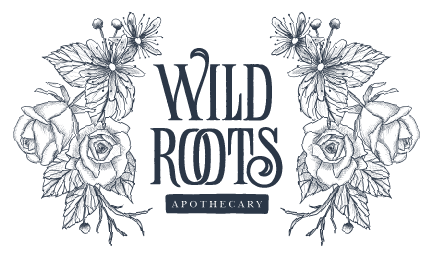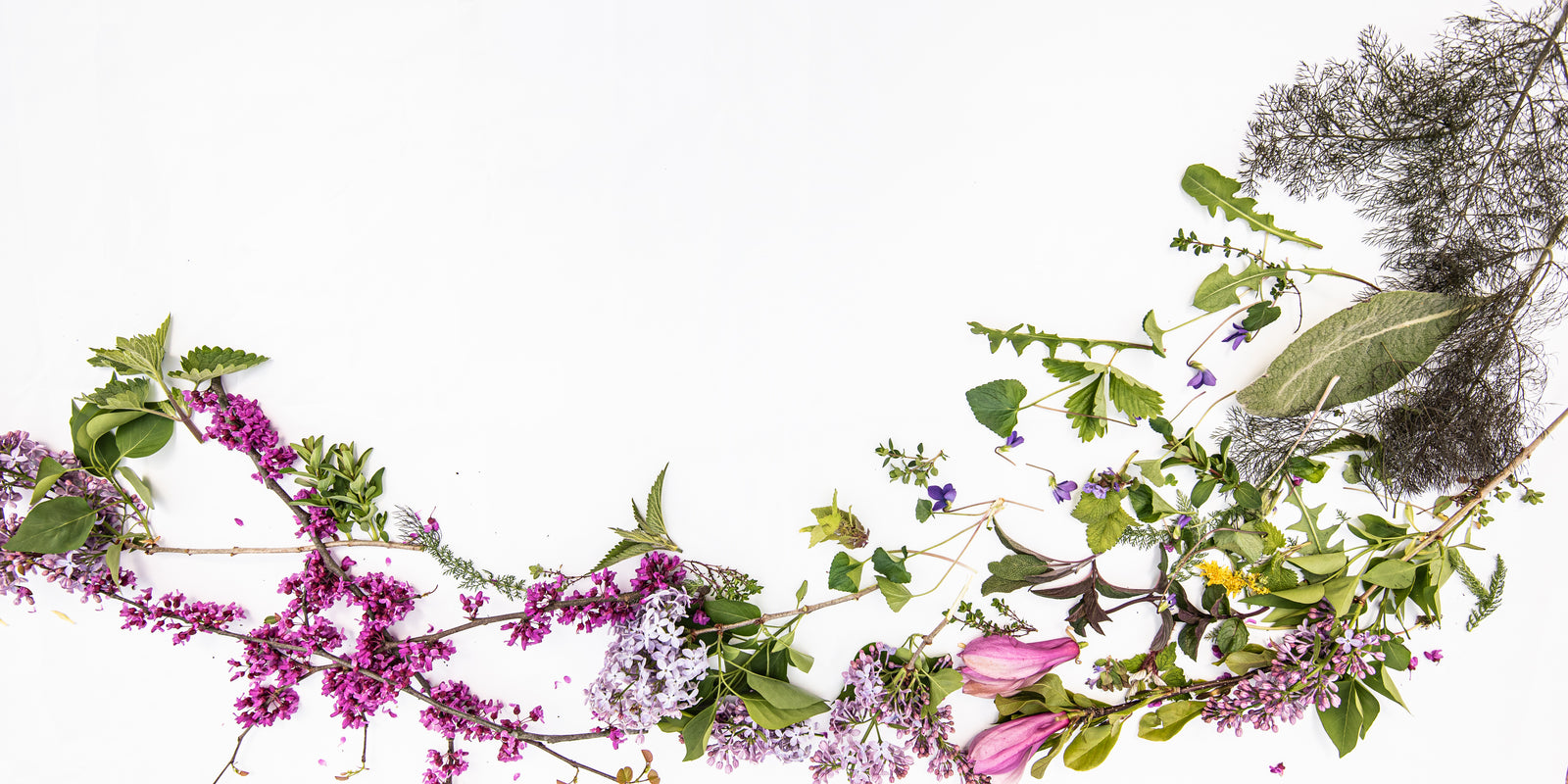FAQ's about our Herbal Products
Wild Roots Apothecary FAQ’s & Definitions
What am I looking at?!?
Every time we hear this question in our store, we relish in the opportunity to share about our magical preparations of herbal goodness. We get it, walking into an apothecary with potions and plants everywhere is overwhelming. But supporting your health with natural remedies isn’t rocket science. Let’s demystify herbal products!
Here are the various offerings we use to deliver medicinal herbs for body, mind and spirit:
Oxymels: From the Latin word oxymeli meaning acid (oxy) and meli (honey), an oxymel is a liquid-infused herbal medicine with a vinegar and honey base. Herbs sit in apple cider vinegar for up to a month to draw out their medicinal properties, and then honey is added to make the vinegar infusion more palatable. The result is a tasty and slightly sweet herbal remedy!
Medicinal Uses: Oxymels are potent medicine, and are especially helpful in healing protocols for children. Each one of our herbal oxymels has a specific medicinal use.
Culinary Uses: Use them as a daily herbal boost to food and beverages to keep your immune system strong and aid in your body’s natural detoxification processes. Add 5-30 drops to still or sparkling water to amplify your hydration in a tasty way. Use it in the place of vinegar to make a salad dressing, in various cocktails or pour a teaspoon or two on top of tacos as a flavor-boosting finishing touch!
Syrups: Honey, sugar or vegetable glycerin is used to preserve medical herbal formulations and deliver plant-powered medicine in the form of a syrup.
Medicinal Uses: Herbal infused syrups are potent medicine, and are especially helpful in healing protocols for children. Do not give children below the age of 12 months old honey-based syrups.
Culinary Uses: Syrups can be used anytime you want to add flavor and a hint of sweetness to your culinary creations. They can be added to smoothies, poured directly on top of ice cream, used to enhance the flavor of desserts, and aid in the creation of unique cocktails.
Electuaries:Also called an herbal honey, an electuary is a powdered herb mixed with raw honey to make a thick paste.
Medicinal Uses:Raw, unpasteurized honey is antimicrobial, anti-inflammatory and anti-allergenic and is even more powerful when combined with medicinal tonic herbs. Depending on the herbs used, it can be used as part of a specific healing protocol or daily for maintenance and prevention. Do not give children below the age of 12 months old honey.
Culinary Uses:Add herbal honey to sweeten tea, in lieu of sugar in baking, and as a spread on bread.
Bitters: Bitters are extracts of bitter-tasting roots, leaves, and berries in alcohol. Bitters have been used throughout history to stimulate the digestive system.
Medicinal Uses: Herbal bitters are an ancient tonic for stimulating the production of bile in the liver which improves the digestion and absorption of fats. Take bitters 5-10 minutes before every meal. Best taken in only 2-3 ounces of water so that your taste buds may experience the bitterness of the herbs, since it is the bitterness of the herbs that enhances the digestive process and promotes the production of digestive enzymes.
Culinary Uses: Adds a creative element to craft cocktails, can be used as part of a pickle brine or marinade, and a tasty digestion-enhancing addition to sparkling water.
Herbal Teas: Hot water is used as the method to extract the medicinal constituents from herbs, which is actually one of the most effective ways to extract the most health-boosting properties from certain herbs.
Medicinal Uses: Do not underestimate the healing power of herbal tea! Tea infusions (when herbs are left to steep in hot water for 8-12 hours in a covered container) are used in healing protocols as well as for maintaining wellness for adults and children.
Culinary Uses: Herbal teas can be consumed hot or iced, and if they consist of herbs (versus tea leaves like black or green tea), herbal tea counts as water! Use herbal as a base for creative cocktails, as the liquid in your smoothies, and even as a soup base.
Tinctures: A tincture is an alcohol extraction of an herb - the alcohol extracts the medicinal constituents of the herb, resulting in a concentrated medicinal liquid.
Medicinal Uses: Tinctures are the strongest method for deriving the therapeutic effects of herbs, and are typically used in a healing protocol versus for maintenance and prevention. Since alcohol is used for extraction, tinctures are not used to treat children. It is best to take tinctures between meals, apart from food. DO NOT take with coffee or black tea.
Culinary Uses: None.
Vinegars: When vinegar is used as a base to extract the medicinal properties of plants, they are a safe and effective way to incorporate herbs into your daily routine. The herbs typically used in a vinegar are those that can be used daily over an extended period of time to maintain health.
Medicinal Uses: Herb-infused vinegars can be mixed with water or iced tea to deliver herbs safely to children.
Culinary Uses: Use instead of any vinegar to give a nutritional boost to a homemade salad dressings, make a shrub or switchel, or use as part of a pickle brine or marinade.
Shrubs: Also called a drinking vinegar, a shrub is an acidic iced beverage that is usually sweetened with honey or maple syrup and sipped in small quantities.
Medicinal Uses: As it typically contains probiotic-packed apple cider vinegar, shrubs are a tasty way to cleanse the body and stimulate digestion for both adults and children.
Culinary Uses: Drink the chilled shrub by itself in a cordial glass or use it as a mixer in water, sparkling water or cocktails.
Salves & Balms: Herbs are infused in oil or butter (such as coconut oil or shea butter) and combined with beeswax and essential oils to create a therapeutic lotion.
Medicinal Uses: Applied topicallyto heal wounds, rashes, and other skin irritations.The skin is one of the largest gateways on the body to receive the medicinal actions of the plants.
Culinary Uses: None.
Capsules & Powders: Herbs and roots are ground to a fine powder and often encapsulated for easy delivery.
Medicinal Uses: Some herbs can have a strong therapeutic effect when taken directly (as opposed to extracted in a liquid base) either in a powder or capsule.
Culinary Uses: Certain powdered herbs can be mixed with oatmeal, yogurt, and beverages like hot chocolate, turmeric lattes as well as smoothies.
Flower Essences: Herbal infusions or decoctions, made from the flowering part of the plant, which uniquely address emotional and mental aspects of wellness.
Medicinal Uses: A safe, homeopathic remedy that can be used daily or as part of a protocol for children and the elderly.
Culinary Uses: None.
Essential Oils:The highly concentrated natural oils in plants derived through water/steam distillation.
Medicinal Uses: Used topically when applied with a carrier oil (such as coconut oil), add a few drops to a warm bath, or diffuse in the air to kill pathogens. Make sure your essential oils are from organically cultivated plant matter and are from a trusted source before using them.
Culinary Uses: Certain essential oils can be used in cooking in very small amounts, but it is important to know which essential oils can be ingested and they should only be used as directed by a trained expert in essential oils.
Hydrosols:Also known as "flower waters," hydrosols are the water soluble constituents in the plant material produced by distilling fresh leaves, fruits, flowers, and other plant materials.Medicinal Uses: With similar properties to essential oils, these aromatic waters are much less concentrated and are safely used topically as a mist to moisturize and heal the skin for children and adults.
Culinary Uses: Use in creative cocktails, as a marinade, and to add a floral taste to dishes.
Bath Salts: Also called a “Bath Tea,” bath salts are a mixture of high quality salt, dried herbs, and possibly essential oils to create a mineral-rich, therapeutic bath.
Medicinal Uses: Add two tablespoons of the bath salt to your warm bath water or foot soak to allow the therapeutic effects of magnesium-rich salt and medicinal herbs to be absorbed by the skin and promote detoxification in the body. Safe for use with children.
Culinary Uses: None. Not for internal use.
Face Grains & Masks: A mixture of bases such as mineral-rich salt and clay is combined with powdered herbs to create an exfoliating face wash or cleansing face mask.
Medicinal Uses: Face grains are used topically as a face wash when exfoliation is needed for dry skin and to clean out pores. Face masks recommended for use at most once a week to cleanse pores and heal damaged, oily or acne-prone skin.
Culinary Uses: None. Not for internal use.
The medicinal products we offer pre-made in our shop are for general wellness and use. If you have a specific health concern, we can formulate potent products that contain a mixture of herbs that are best suited for your unique condition and medical history.
Dosage is dependent on your health issue, weight and medical history, so we recommend scheduling a wellness consultation with Colleen for a personalized healing or maintenance protocol.

